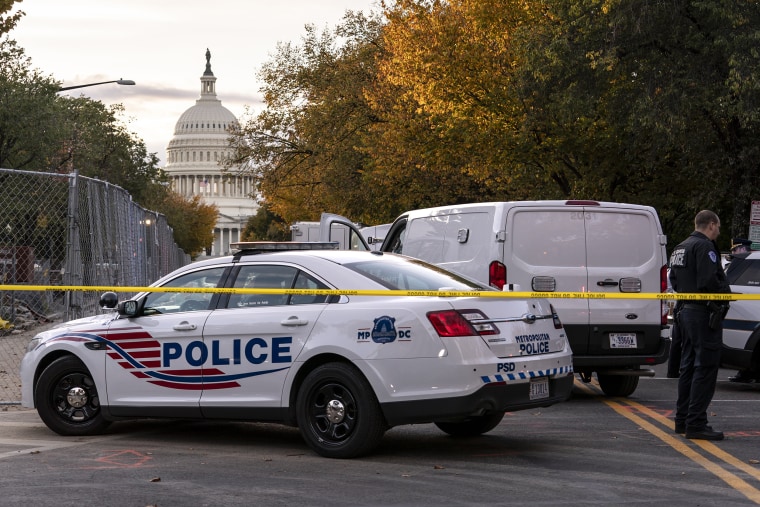WASHINGTON — The Senate passed a GOP-backed measure on Wednesday that would overturn criminal law changes approved by the D.C. Council, dividing Democrats and drawing sharp rebukes from proponents of statehood for the nation's capital.
The 81-14 vote sends the disapproval measure to President Joe Biden's desk. The House passed the resolution last month.
Biden has said he will sign it into law, effectively preventing the council-approved changes from taking effect.
The Senate vote marked a rare split between the top two Democrats: Senate Majority Leader Chuck Schumer voted for the measure, while Majority Whip Dick Durbin was among the 14 who opposed it.
No Republicans voted against the resolution, and Democratic Sen. Raphael Warnock of Georgia voted "present."
Many Democrats voted to reject the resolution on policy grounds and on the basis of supporting sovereignty for Washington, D.C.
“The elected representatives of the District of Columbia, after exhaustive review, made some decisions about criminal justice reform. I don’t agree with every single one of them they made but I’ll tell you this, what they did is entirely defensible,” Sen. Chris Van Hollen, a Democrat from neighboring Maryland, said. “And it certainly doesn’t rise to the level of the United States Congress for the first time in 30 years big-footing their decisions.”
The issue has tied Democrats in knots. The D.C. Council adopted changes late last year to remove most mandatory minimum sentences and lower mandatory maximum penalties, NBC Washington reported. Democratic Mayor Muriel Bowser vetoed it, only to have her veto overridden. Then, despite opposing the new law, she called on Congress to stay out of local affairs and not to intervene, citing Washington’s sovereignty.
“Led by the president, the Democrats are in full retreat on the D.C. criminal law issue,” Senate Minority Leader Mitch McConnell, R-Ky., an opponent of D.C. statehood, told reporters. He said the Washington crime law represents “a correct time for federal intervention to protect our constituents and our staff.”
At a rally before the vote Wednesday, Eleanor Holmes Norton, D.C.'s non-voting delegate to the House, called the legislation an "attack on home rule."
“We have come together today with one simple message for Congress and President Biden: Keep your hands off D.C.,” Norton, a Democrat, said. “You either support D.C. home rule or you don’t. There are no exceptions and there is no middle ground on D.C.’s right to self-government.”
Biden shocked many Democrats last week when he said in a closed-door Senate lunch meeting that he would sign the resolution to block D.C.'s criminal code changes — even as he proclaimed his support for statehood and "home rule."
Biden's position comes as he seeks to blunt the GOP's political assault on Democrats over crime before the expected launch of his re-election campaign. Biden has sought to distance himself from some on the left and back tough-on-crime measures.
After Biden’s announcement, D.C. Council Chair Phil Mendelson sought to withdraw the measure from Congress to prevent the vote, but Senate leadership aides said it was too late to pull it back.
"No matter how hard they try, the Council cannot avoid accountability for passing this disastrous, dangerous DC soft-on-crime bill that will make residents and visitors less safe," said Sen. Bill Hagerty, R-Tenn., who led the disapproval resolution.
Some Democrats defended the merits of the changes sought by the D.C. Council.
“These are sensible proposals to update a criminal justice code that hasn’t been changed since 1901. And the changes are in line with the majority of states around this country. Secondly, I believe in D.C. home rule. And third, the District itself is trying to withdraw this bill, and Congress’ efforts to go forward and vote on it anyway is just a way to try to exert power over 700,000 people who ought to have their own state,” Sen. Elizabeth Warren of Massachusetts said in an interview.
But some Democrats who support D.C. statehood took a different stance. Sen. Tammy Baldwin, D-Wis., who faces re-election in 2024, said, “I think D.C. has to do it over again.”
“I do support D.C. statehood, and yet they are not yet a state and we do have those oversight responsibilities,” Baldwin said. “And the highest calling of a representative is to keep their constituents safe... whether that’s back in Wisconsin or whether that’s Wisconsinites coming to visit here or staff members who live here.”
Sen. Cory Booker, D-N.J., implored his colleagues at a Tuesday lunch meeting to read the crime bill before voting.
“I’m just simply saying, I have never seen something like this in my 10 years,” Booker said of his speech to the caucus. “When you actually read the bill, compare it to criminal codes of other states, it is stunning to me that somehow this has been perverted and distorted to be seen as something that is some kind of lax loosening of penalties on people doing bad things.”
The Republican-led House voted 250-173 last month to block the measure — all 173 opponents were Democrats.
Even staunch Biden allies in Democratic leadership say the White House mishandled the issue. Durbin said the White House sent a “mixed signal” and could have communicated better.
“They gave a signal that led the House Democrats to take certain action. And the president then took a different position when he came to the Senate,” he said. “Speaks for itself.”


